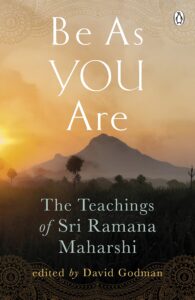An Introduction to Self-Inquiry: A Potent Method for Self-Realization
What is Self-Inquiry and How to Practice It
Who am I? (Nan Yar?)
PART ONE:
My Experience
Many people who have experienced “The Dark Night of the Soul” or have been meditating for a long time, are eventually drawn to self-inquiry. Often, questions like “who am I?” begin to arise.
I first stumbled upon self-inquiry (Atma Vichara) through a documentary about a sage from India, Sri Ramana Maharshi, who offered this practice to spiritual aspirants as a means for spiritual liberation. Self-inquiry removes the obstacles and illusions that stand in the way of self-realization.
In the beginning, I could not grasp the heart of this meditative practice but eventually returned to it. Now I understand that self-inquiry is one of the highest teachings for self-realization.
Knowing who you really are is freedom.

The Dark Night
One day, I was at the beach and my mood was exceptionally low. Countless questions about life and death filled my mind, and I recalled that Ramana Maharshi once had a death experience.
So, I laid down on the sand and imagined my own body going through the process of death. I felt afraid but endured it, accepting that this will one day be my fate. Eventually, the fear dissolved.
As I envisioned transitioning from life to death, it became clear that only my body dies, yet, I remain. I became aware of the subject-object relationship that existed between myself as the subject, and my body as the object.
As the observer, I also became aware of my mind as another object. If both mind and body were objects that I could perceive, then who was I? For, I could not possibly be the objects of my perception, so who then was the subject?
As the subject, trying to find myself stumped my mind because all that is perceptible is merely another object arising in my field of awareness.
In truth, there is neither subject nor object and this duality only exists in the mind. Little did I know, I had embraced the heart of self-inquiry.
For years, I kept my experience private because the few times I tried to explain what I discovered, I received quizzical looks. However, many others are also seeking self-realization. So, I would like to provide you with an introduction to the practice of self-inquiry.

PART TWO:
Practice
I advise reading the following slowly and really taking in what is being shared. To be clear, introspection has to do with inquiring about oneself, whereas self-inquiry focuses on the source of oneself.
So, it is not the same as self-analysis or self-reflection. Instead, self-inquiry is a method for removing all falsity that stands in the way of realizing the True Self. In fact, self-realization often begins by realizing what we are not.
This isn’t something you can breeze through if you’re new to the practice of self-inquiry, as the fundamental point may be missed.
If you have already been meditating and practicing mindfulness, I find this method to be a more direct path to self-realization.
Note: Atma Vichara (self-inquiry) is a yogic practice and is one of the main methods in Advaita Vedanta and the path of jnana yoga.
To begin, simply put, whatever you can perceive is not you
Bring your attention to the feeling of being, the sense “I am.”
In other words, as human beings, we are consciously aware of ourselves and of our experiences. We can affirm that “I exist”, and that “I am”.
When one inquires who is this “I” that exists, then the practice begins.
You exist, but as to whom do you exist?
The mind may get tired as you practice self-inquiry, but remember this is the most important discovery you can make. You are also aware of tiredness arising in the mind.
Ask yourself “who am I?” and see what comes up.
While it is clear that you are not your surroundings or environment, who you are may still be unclear.
For instance, when people think “I”, they usually think “I am my body, I am my mind, my name, my career, I am spiritual, I am depressed, I am athletic, etc.”
Really, you are not any of those things. You have these things, experience certain states, and play certain roles throughout your life.
Your name is something people call you, your career is what you do, even your physical traits are merely related to your body.
You are not these things, rather, you are the awareness of them.
Next, notice your sense perceptions
Continue your self-inquiry by becoming aware of your sense of smell, taste, hearing, feeling, and seeing. Realize that these all change, but who you are is unaffected by them.
For example, if you lost your vision or hearing, that sense of “I”, and the sense of being is not impacted by your ability to see or hear. In other words, who you are would not change.
Ask yourself again, “who am I?”
Your body is something that you can experience and perceive.
The body has been changing all throughout your life. If you lost a limb, could you say you have lost who you are? Your sense of self would persist and therefore you would not merely be a body.
The body has grown and evolved since birth, it is always changing and the cells in your body continually die and regenerate.
Your body is never actually the same throughout your life, yet, you have always experienced the sense “I exist”. This feeling has remained constant.
Likewise, you can perceive your body. So, the deeper question is “to whom does this body arise to?” or “who am I that is aware of this body?”
So, as you continue to inquire “who am I?” you begin to discard thoughts like “I am John”, or “I am a mother” because even this is not who you are, it is only a role.
You are not a role. To say “I am a female” is merely referring to the gender of the body, which again, you are not. A body is something you have, it is not who you are.
I am my thoughts, I am my mind, I am my beliefs
This cannot be true, for you perceive your own thoughts and beliefs too. Instead, you are the awareness of thoughts and beliefs. You are the one who hears the mind’s chatter.
Whatever comes up, the practice can be summed up with this question: “to whom does this arise?”
This practice of self-inquiry is about finding out who you are in your essence.
It can be said that you are experiencing a state of existence because even this feeling of being is perceivable. So, as you continue to inquire into who you are, you become aware of the subtle sense and the feeling “I exist” or “I am”.
Maintain your attention on the experience of existence (aka, presence, beingness, isness, hereness), and stay in this awareness.
Notice that thoughts and feelings will arise, and you will become aware of the body.
Likewise, you will become aware of your own voice, the voice of the mind, your heart beating, and your movements.
Then, you will see that all of these things are appearing in your field of awareness.
It is not enough to comprehend this intellectually; this understanding comes through experience alone.
So again, continue to inquire if all of this is appearing in your field of awareness then ask, “to whom does this appear to?”
As you continue to inquire, you will only see who you are NOT. You will be able to witness all physical, mental, and emotional forms.
Furthermore, you will recognize the ego, the false sense of self. It is the mental patterns constructed from your beliefs and experiences, which have been programmed into your psyche.
We are not anything that we perceive. What is perceived is in relation to subject and object. If it can be perceived it is merely another object.
Can you perceive the one who is perceiving? The subject?

Diligence and Continuity
One should continuously practice this for as long as there is a sense of “I” and “other” i.e. subject and object.
Continue to seek the source of “I” until there is no sense of self left to continue the inquiry. This method alone is enough to attain self-realization and liberation.
In other words, the “I” becomes the object of meditation and as it does you will witness desires, ego, emotional states, and even spiritual states arise in you.
You will become aware of what you are not and in doing so, realize your True Self which is imperceptible, boundless, and eternal.
Furthermore, stay with the sense “I am” or “I exist”, because this you can be sure about, all else is unstable. When you can stay with this sense of beingness, you will notice that this too is perceived by you.
This practice is simple but it requires diligence and continuity because of the tendency to identify with the ego and the body.
Conclusion
When you practice self-inquiry, you will let go of what you are not, and come to know who you are.
You will bear witness to all manifestations of your inner and outer world, and you will see that who you are is untouched even by death.
The sense of duality will seize, including the duality between subject-object, and you will discover the bliss beyond bliss.
Your essence is peace and love, and as the sage Nisargadatta Maharaj has said, “wisdom is knowing I am nothing, love is knowing I am everything, and between the two my life moves.”
Sending you endless love and encouragement,
Ravelle
If you found value in this post, join my email list to get updates on self-inquiry, meditation, and spiritual teachings.
Recommended Reading – More guidance on Self-inquiry:
Ramana Maharshi’s teachings and instructions for self-inquiry (PDF):
https://www.sriramanamaharshi.org/wp-content/uploads/2012/12/who_am_I.pdf
Recommended books:
Be As You Are: The Teachings of Sri Ramana Maharshi
Related articles:
Self-Realization and Freedom from Suffering



Dear Ravelle,
I am humbly grateful for the clarity with which you present this important concept of self-inquiry. There is a freshness of transmission in your approach, in your distillation of the truth underlying self-awareness. Your process is simple and straightforward. This is your gift to us – a guiding light shown in the shadowy conditional reality that we live through. Who am I? I am not this or that or the other thing. Thank you. May you never weary from bearing the torch.
Thank you so much for your heartfelt comment, dear Bill. I deeply appreciate the love and kindness contained in your words and I am moved by your support and gratitude. Your very presence inspires me! Endless love to you, always. 🙏🏽❤️
Great explanation of self inquiry! This was a very interesting and useful article.
Namaste Sam, thank you for your kind words. May the inquiry be useful in the recognition of truth, as it has been for me. 🙏❤️